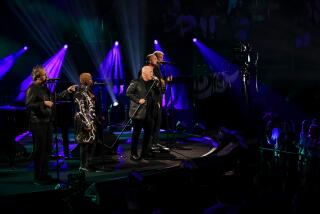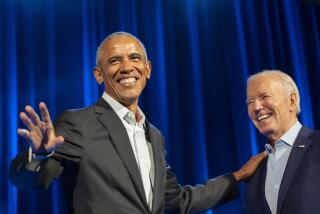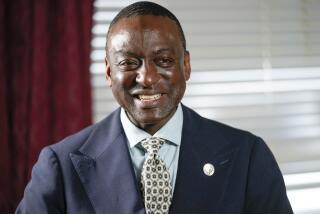New York Eager to Greet Mandela : Civil rights: South African’s visit is stirring the city with hero worship. Blacks have hopes he can spur racial progress.
NEW YORK — The Rev. Herbert Daughtry stood in the pulpit of the yellow brick House of the Lord Pentecostal Church in Brooklyn as parishioners fanned themselves against the heat with cardboard fans decorated with the dove of peace.
“This is a momentous time in history,” the minister announced. “If you live on Mars, you would have heard Nelson and Winnie Mandela will be in town this week.”
Daughtry praised the persistence of the South African leader, who was imprisoned for almost three decades in the struggle against apartheid before being released in February.
“What he says to all the world is you can’t break my spirit,” Daughtry said. “You can put me in jail for 27 years, but, when I walk out into the sunlight, my spirit will not be broken. My head is high on my shoulders and my spirit is as determined as ever.”
Minutes later, the Sunday worshipers were on their feet, singing, swaying and stomping their feet so hard to the gospel rhythms that the waxed floor of the church shook.
“Man-dela! Man-dela!” they chanted.
“I’ve been in the struggle since 1971, participating in anti-apartheid meetings and marches,” said Lillian Vaughan when services were over. “It’s like a member of my family is coming home at last. It really is overwhelming.”
Nearby, in another pew, Pauline Watkins voiced her own emotions with a single word, repeated over and over: “Hope, hope, hope.”
From parishioners in Brooklyn’s black community to New York City’s highest officeholder to ordinary people on the streets of Harlem, the three-day visit of Nelson Mandela is stirring hero worship and hopes for racial progress among blacks on a scale unseen since the days of the martyred civil rights leaders Dr. Martin Luther King Jr. and Malcolm X.
Mandela, the deputy leader of the once-banned African National Congress, is seen by many black New Yorkers as a symbol of resistance, patience and justice in the face of overwhelming odds. In a large measure, his triumph is their triumph.
“It’s one of the greatest things that could be done, his coming through New York,” said Henry L. Finley, 67, a black Harlem businessman. “We’re looking to go forward, not backward. His release from prison gives hope that even more may happen to improve conditions” for black people everywhere.
The 71-year-old Mandela arrives Wednesday. He will be welcomed at John F. Kennedy International Airport, then will go by motorcade through Brooklyn’s largely black Bedford-Stuyvesant neighborhood and will be given a traditional ticker-tape parade up New York’s canyon of heroes in Lower Manhattan and a City Hall reception.
During his time in New York, he will also travel by motorcade through Harlem, speak to a rally at Yankee Stadium in the Bronx, address the United Nations and meet with numerous groups, ranging from high school students and business leaders to African-American journalists and South African exiles.
At Mandela’s side during much of the visit will be New York’s first black mayor, David N. Dinkins, who regards his guest as a genuine hero and has declared that welcoming Mandela is “probably the greatest thing that will happen to me.”
“I’m really excited,” said Kimara Nicholas, 15, a recent Harlem junior high school graduate. “He represents freedom. He’s going to inspire all the minorities here and, hopefully, he’ll inspire some white people, too.”
Mandela’s visit to New York, first stop on a nationwide tour covering eight cities, is bringing security preparations not seen since Pope John Paul II was here in 1987.
A vehicle patterned after the “Popemobile,” with its wraparound, bulletproof screen, is being readied so that Mandela can ride safely through the streets in plain view of the expected hordes of spectators.
The State Department’s Diplomatic Security Service will have prime responsibility for protecting Mandela, backed by uniformed officers, mounted policemen, helicopter patrols and bomb-sniffing dogs from the police department.
Mandela will stay at Gracie Mansion, the mayor’s official residence. Hidden in the main auditorium of Doctors Hospital, just down the street from the mansion, will be a reserve force of more than 100 police officers to back up the considerable contingents on the streets.
New York’s ubiquitous street vendors are already beginning to cash in on the visit. On 135th Street in Harlem on Monday, Neville Bird flipped through a stack of T-shirts with Mandela’s likeness and the quotation: “I’m not free until we’re all free.”
“These are selling big,” Bird said. “This is my second shipment.”
But there were worries that the concert at Yankee Stadium honoring Mandela could be lightly attended in the face of what was described as a conflict over ticket sales techniques. In an effort to boost badly lagging sales, the New York Mandela organizing committee bought radio spots on 10 New York stations advertising the event.
And Bill Graham, the veteran rock promoter who organized last year’s Amnesty International benefit concerts, bowed out of coordinating the New York tribute, although he will continue to produce a Mandela concert in Oakland. His place was taken by promoter Ron Delsener.
In an interview, Graham refused to discuss his differences with New York planners. He said that so far 27,000 tickets for the Oakland event on June 30 had been sold and he was confident that the concert, the last major public event of the tour, would be a sellout.
“There was a difference in marketing philosophy,” said a spokesman for the Terry Williams Agency, which is helping coordinate the black nationalist’s New York visit. “Ticket sales were slow but are picking up.”
More to Read
Sign up for Essential California
The most important California stories and recommendations in your inbox every morning.
You may occasionally receive promotional content from the Los Angeles Times.










